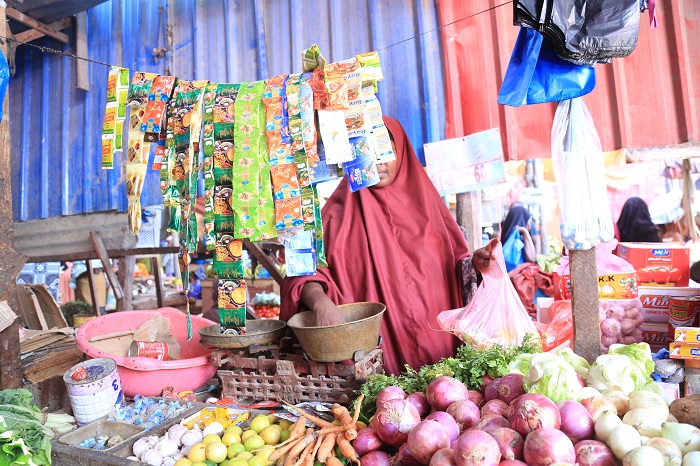Women in Somalia build family livelihoods through microenterprises

Women in Somalia have for many years been central to fostering family livelihoods thanks to their hard work and entrepreneurial spirit. This observation became even more actualised during and after the civil war period when single-parent families became the norm as many men died or were maimed.
In Mogadishu and other parts of the country, women run roadside kiosks selling tea, meat, or the popular stimulant drug khat. Many more operate shops and sell products in markets, while others are involved in productive sectors such as fisheries, livestock or crop farming.
This resilience and determination have seen many women contribute to family livelihoods by generating income that allows them to provide basic needs, educate their children and even contribute to other development ventures outside the family.
AECF implementing partner IBS Bank now provide loans under three categories through an EU-funded programme Financing Inclusive Growth in Somalia (FIG-Programme) facility
Aisha Aden is a mother of six children living in Mogadishu’s Warta Nabada district. Her husband was killed in clan conflicts in the Lower Shabelle region, forcing her to move to Mogadishu, where she did menial jobs to feed and house her children. “The whole burden of raising these children fell on my shoulders after my husband died,” says Aisha as she sorts out vegetables and fruits which she bought from the market in the morning. After one and half years, Aisha says, she got a small kiosk on the roadside and started selling tea and local sustenances. “I did this for another three years, but luckily, a friend told me IBS Bank (AECF FIG Somalia Partner) was advancing loans to women in business. I applied and got US$400, which enabled me to move to this location where I set up this stall and ventured into the vegetable and fruits business.” Amina says she now generates up to US$350 per month after the investment, which she says is enough to feed her children, buy clothes and pay their school fees.
AECF implementing partner IBS Bank now provide loans under three categories through an EU-funded programme Financing Inclusive Growth in Somalia (FIG-Programme) facility. These are Kalkaal, which targets the agri-food sector, Haween-Kaab, which supports women micro-enterprises and Ileys, a youth-focused financing facility aiming to create jobs and alleviate poverty by financing youth enterprises.
Zeinab Mohamed, an economist and businesswoman in Beletweyne, says women in Somalia have been the longest bedrock of most families. “It does not mean that they (women) take over as the heads of families when the men are there. Rather, it means that women are the engine in most families in Somalia. They are engaged in different income-generating activities, and at the end of the day, there is food on the table.”
According to Zeinab, men are focused on generating ‘big money’, which hardly comes, but women are contented with the little which comes their way. Eventually, they keep families running when the men still wait to ‘make a kill.’
The FIG-Somalia programme has been instrumental in supporting women entrepreneurs in Somalia to expand their businesses, resulting in increased income and subsequent sustainable livelihoods.